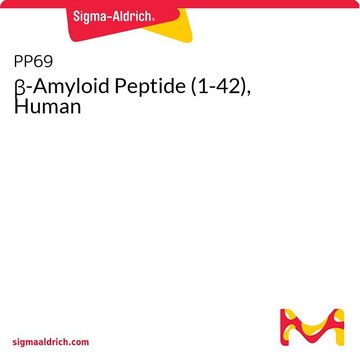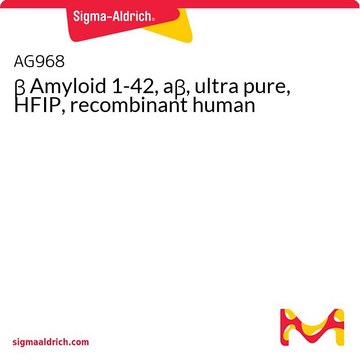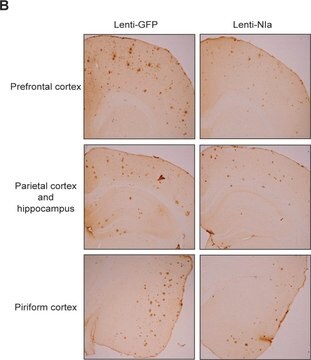ABN1665
Anti-Aβ-42 Antibody, oligomeric (VIA)
from rabbit
Synonym(s):
Aβ-42 oligomer, Abeta-42 oligomer, Oligomeric Aβ-42, Oligomeric Abeta-42
About This Item
Recommended Products
biological source
rabbit
Quality Level
antibody form
affinity isolated antibody
antibody product type
primary antibodies
clone
polyclonal
species reactivity
human
technique(s)
dot blot: suitable
neutralization: suitable
western blot: suitable
UniProt accession no.
shipped in
ambient
target post-translational modification
unmodified
Gene Information
human ... APP(351)
General description
Application
Neutralizing Analysis: A representative lot neutralized Aβ-42 toxicity to cultured SH-SY5Y cells (Bodani, R.U., et al. (2015). ACS Chem. Neurosci. 6(12):1981-1989).
Western Blotting Analysis: A representative lot detected oligomeric Aβ-42, but not monomeric Aβ-42, monomeric or oligomeric A -40 (Bodani, R.U., et al. (2015). ACS Chem. Neurosci. 6(12):1981-1989).
Note: Both purified antibody (Cat. No. ABN1665) and unpurified antiserum (Cat. No. ABN1650) are suitable for Dot blot, immunofluorescence, immunohistochemistry, and Western blotting applications. However, we recommend using only the purified antibody for neutralization studies.
Quality
Dot Blot Analysis: 6.67 µg/mL of this antibody detected recombinant Aβ-42, but not Aβ-40, oligomer.
Target description
Physical form
Other Notes
Not finding the right product?
Try our Product Selector Tool.
Storage Class Code
12 - Non Combustible Liquids
WGK
WGK 2
Regulatory Listings
Regulatory Listings are mainly provided for chemical products. Only limited information can be provided here for non-chemical products. No entry means none of the components are listed. It is the user’s obligation to ensure the safe and legal use of the product.
JAN Code
ABN1665:
Certificates of Analysis (COA)
Search for Certificates of Analysis (COA) by entering the products Lot/Batch Number. Lot and Batch Numbers can be found on a product’s label following the words ‘Lot’ or ‘Batch’.
Already Own This Product?
Find documentation for the products that you have recently purchased in the Document Library.
Our team of scientists has experience in all areas of research including Life Science, Material Science, Chemical Synthesis, Chromatography, Analytical and many others.
Contact Technical Service








